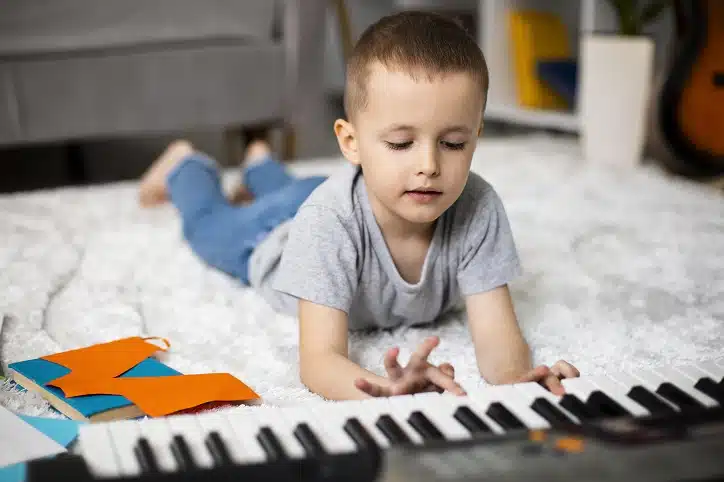You’ve probably seen your child light up when their favorite song comes on—or watched them bounce, clap, or hum along to a tune without even being taught. But did you know that these joyful little musical moments are doing more than just entertaining them? They’re building your child’s brain.
At Focus on Kids Pediatrics, we love sharing research-backed ways parents can support healthy development—and music is one of the most powerful tools available. Whether it’s lullabies before bed, singalongs in the car, or music lessons later on, the impact of music on a child’s growing brain is real, measurable, and lasting.
Here are 5 surprising ways music boosts your child’s brain development and cognitive skills, starting from infancy through the school years.

1. Music Strengthens Language and Communication
Even before babies speak, their brains are wired to recognize patterns in sound. Music helps them:
- Understand rhythm, tone, and pitch (all foundations of speech)
- Differentiate syllables and word patterns
- Build early listening and memory skills
According to the National Institutes of Health (NIH), music exposure in infancy is linked to earlier language milestones and stronger verbal development. Singing to your baby isn’t just bonding—it’s literally teaching them how to speak.
For children with delayed speech or communication struggles, early musical exposure can complement interventions like speech therapy.
2. It Boosts Brain Connectivity and Executive Function
Music activates multiple regions of the brain at once—including those responsible for focus, memory, and emotional regulation. Studies show that children who engage with music regularly have better executive function, which includes:
- Concentration and attention span
- Impulse control
- Working memory (critical for learning)
A study from the University of Southern California found that children who received music instruction had more developed brain structures related to decision-making and problem-solving—skills they’ll use far beyond music class.
You can also support your child’s mental performance through cognitive development activities outside of music to help round out their growth.
3. Music Encourages Social and Emotional Growth
Whether it’s a music circle at preschool or a sibling duet at home, music helps children:
- Cooperate with others
- Interpret emotions
- Express feelings in a healthy way
Singing and playing instruments in a group setting teaches patience, empathy, and turn-taking—all core social skills. And for shy or nonverbal kids, music can become a safe emotional outlet, helping them communicate what words can’t.
This ties closely into the importance of socialization in early childhood, a key factor in long-term emotional health.
4. It Supports Motor Skills and Physical Coordination
Clapping, tapping, and dancing to music all support gross and fine motor development. From toddlers moving to the beat to older kids playing instruments, musical activities strengthen:
- Hand-eye coordination
- Body awareness
- Bilateral movement (using both sides of the body together)
These motor gains translate to better handwriting, sports skills, and daily physical tasks like tying shoes or using utensils. If your child struggles with coordination, music may work alongside therapies such as pediatric occupational therapy to support growth.
5. Music Builds Confidence and Self-Esteem
Learning a song, performing for family, or simply singing along builds a sense of accomplishment in children. Music encourages kids to:
- Take creative risks
- Develop their unique voice
- Stick with a skill through practice
This is especially helpful for children navigating anxiety, learning differences, or social challenges. Music becomes a personal win—something they can own, enjoy, and be proud of.
Music can also be an effective form of emotional support, especially when combined with other approaches for improving children’s mental health.
Final Thoughts
Music is more than background noise—it’s a tool for connection, creativity, and brain development. Whether your child is a budding musician or just loves to dance in the kitchen, you’re doing more than entertaining them—you’re helping shape their learning, communication, and emotional growth.
At Focus on Kids Pediatrics, we’re committed to providing comprehensive pediatric care that supports every aspect of your child’s development—from their physical health to their emotional and cognitive milestones. If you ever have questions about early development, learning concerns, or enrichment activities, we’re here to partner with you every step of the way.


